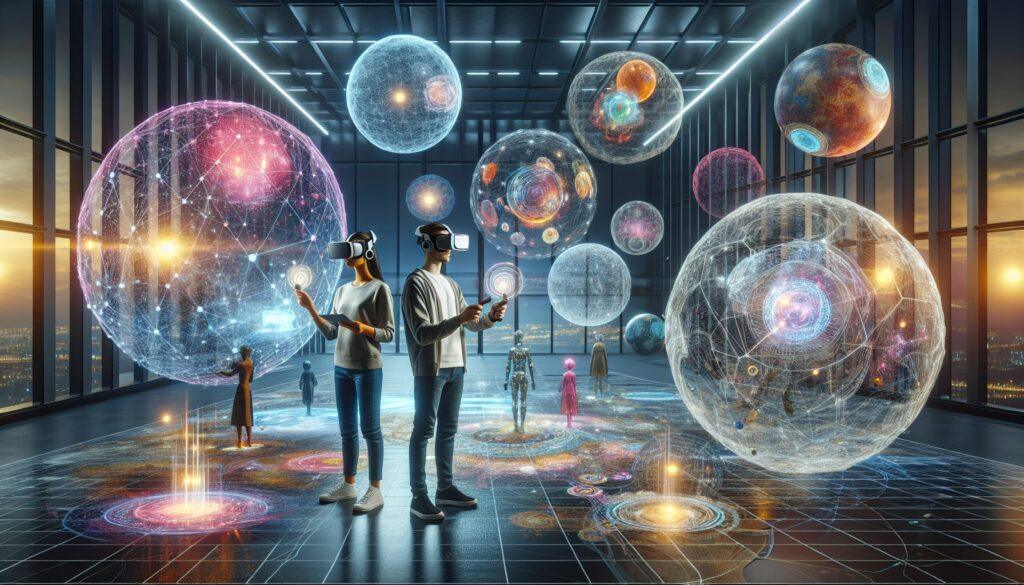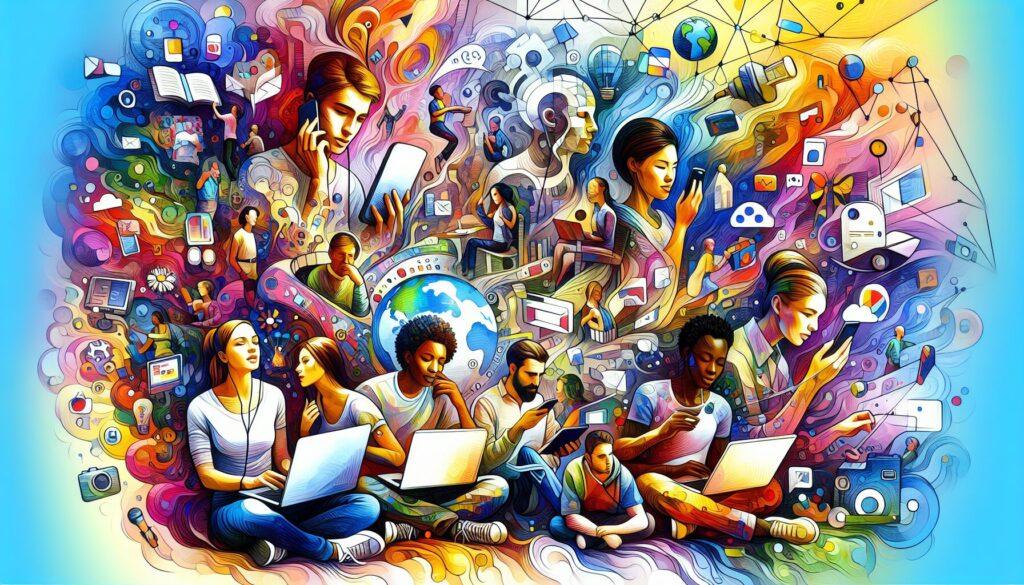Metaverse Economy
As the metaverse economy expands, the concept of AI personalization becomes increasingly pivotal. Within these immersive digital realms, AI-driven customization tailors experiences to individual preferences, enhancing user engagement and satisfaction. From personalized avatars to adaptive virtual storefronts, AI algorithms are designed to learn from user interactions, ensuring that each venture into the metaverse is as unique as the user themselves.
This level of personalization not only fosters a deeper connection between virtual environments and their inhabitants but also opens up new avenues for targeted marketing and monetization strategies within the metaverse ecosystem. The idea of the metaverse has quickly transitioned from a science fiction fantasy to a burgeoning actuality, poised to revolutionize the economic system as we all know it.
As digital landscapes change into more and more refined, companies and people are exploring the huge potential of this digital realm. This article delves into the future of the metaverse economic system, providing insights into its alternatives, challenges, and the transformative impression it might have on our lives.

Q&A Format
Q1: What is the metaverse economy?
A1: The metaverse economy refers to a fully-fledged digital ecosystem where users can create, buy, and sell goods and services within a virtual space. It extends beyond mere gaming or social interactions to encompass a wide variety of economic activities, including commerce, real estate, and even employment opportunities.
This immersive economy is powered by virtual currencies and blockchain technology, enabling secure transactions and authentic ownership of digital assets. The metaverse economic system refers to the financial actions that happen inside digital worlds.
This consists of the shopping for and promoting of digital property, digital actual property, and providers. As more folks have interaction in these digital environments, the metaverse economic system is predicted to broaden, creating new alternatives for commerce and innovation.
Q2: What Opportunities Does the Metaverse Economy Present?
A2: The metaverse economy presents a plethora of opportunities for both individuals and businesses alike. Entrepreneurs can create and monetize unique experiences, digital goods, and services within these virtual spaces, tapping into a market that transcends physical boundaries.
This digital frontier also opens up innovative job roles and investment possibilities, as the infrastructure of the metaverse evolves to support a growing user base seeking immersive, interactive, and personalized content. The metaverse economic system gives quite a few alternatives:
1: New Business Models: As AI-driven personalization becomes the norm within the metaverse, businesses are quick to adapt by offering tailored experiences to users. This shift allows companies to create unique value propositions by leveraging user data to customize virtual environments, advertisements, and even narrative experiences in real-time.
The ability to dynamically adjust content based on user preferences not only enhances user engagement but also opens the door to more nuanced monetization strategies, such as personalized virtual goods and services that cater to the individual tastes and behaviors of each user. Companies can create digital shops, provide digital items, and present immersive experiences to clients.
2: Job Creation: 3: Enhanced User Engagement: AI personalization goes beyond mere customization by fostering deeper connections between users and digital platforms. By analyzing user data and predicting preferences, AI can deliver content that resonates on a personal level, leading to increased time spent on the platform and higher user satisfaction.
This not only benefits the consumer by providing a more tailored experience but also bolsters the platform’s relevance and stickiness, encouraging repeat visits and prolonged engagement. New roles will emerge, starting from digital architects to digital tour guides, catering to the wants of the metaverse.
3: Global Access: Enhanced User Experience: AI personalization in the metaverse goes beyond mere convenience; it revolutionizes how users interact with digital environments. By analyzing individual preferences and behaviors, AI can curate content, environments, and interactions that are uniquely satisfying for each user.
This level of customization ensures that every journey through the metaverse is as engaging as it is unique, fostering a sense of discovery and delight that keeps users deeply immersed in the experience. Individuals from anyplace in the world can take part, democratizing entry to financial alternatives.
4: Innovation: The advent of AI personalization in the metaverse extends beyond mere entertainment and leisure; it heralds a new era of customized learning and development. By leveraging sophisticated algorithms, educational experiences can be tailored to individual learning styles and pace, revolutionizing the way knowledge is acquired and skills are honed.
This personalized approach not only enhances the learning curve but also makes it more accessible, breaking down barriers that have traditionally hindered personal and professional growth. The metaverse encourages creativity and innovation, fostering the growth of new applied sciences and options.
Q3: What Are the Major Challenges Facing the Metaverse Economy?
A3: One of the major challenges facing the metaverse economy is ensuring equitable access and preventing the digital divide from widening. As the metaverse grows, there is a risk that those without the necessary technological resources or skills could be left behind, exacerbating existing social and economic inequalities.
Moreover, the development of a comprehensive governance framework to address issues of privacy, security, and digital identity is critical in establishing trust and stability within the metaverse economy.
Another significant hurdle is the need for interoperability between different virtual spaces and platforms, which is essential for a seamless user experience and for the metaverse to reach its full economic potential. Despite its potential, the metaverse economic system faces a number of challenges:
1: Regulation and Governance: Establishing effective regulation and governance within the metaverse is a complex task due to its decentralized nature and the convergence of multiple jurisdictions. Policymakers and stakeholders must navigate a fine balance between fostering innovation and protecting users from potential harms such as privacy breaches, cyberbullying, and financial fraud.
As the metaverse continues to evolve, it will be crucial to develop a framework that ensures ethical standards, legal compliance, and the promotion of a safe and inclusive environment for all participants. Establishing legal guidelines and pointers for digital environments is advanced and essential to ensure safety and equity.
2: Digital Divide: The proliferation of AI personalization has the potential to exacerbate the digital divide, creating a chasm between those who have access to personalized digital experiences and those who do not. This divide extends not only to the availability of technology but also to the quality and relevance of the personalized content being delivered.
To bridge this gap, it is imperative to implement policies that ensure equitable access to AI technologies and to foster digital literacy, so that all individuals can benefit from the advancements in AI personalization.
Not everybody has entry to the expertise required to take part, probably widening the hole between completely different socio-economic teams.
3: Security Concerns: Security concerns are paramount when it comes to AI personalization. With increasing amounts of personal data being collected and analyzed, there is a heightened risk of privacy breaches and identity theft.
Companies and developers must prioritize the implementation of robust security measures to protect user data from unauthorized access and cyber-attacks.
Additionally, transparent privacy policies and user consent are critical to maintaining trust and ensuring that personalization does not come at the cost of individual privacy rights. Protecting customers’ information and digital property from cyber threats is essential.
4: Sustainability: Sustainability in AI personalization is not just about the environmental impact of data centers and the energy consumption of machine learning algorithms. It’s also about creating systems that are enduring and adaptable to the evolving needs of users.
By designing AI with sustainability in mind, businesses can ensure that their personalization efforts remain effective over time, reducing the need for constant redevelopment and the associated resource waste.
This approach supports a long-term vision where personalization becomes a seamless, integrated part of the user experience, continually adapting to changes without a significant carbon footprint. The environmental impact of the metaverse, especially in terms of power consumption, must be addressed.
This autumn: How Will the Metaverse Economy Impact Traditional Industries?
A4: As we delve deeper into the potential of the metaverse, it’s essential to consider how this burgeoning digital economy will intersect with, and possibly disrupt, established industries. Traditional sectors such as retail, real estate, and entertainment may find themselves competing with virtual counterparts that offer immersive, customizable experiences.
With the metaverse’s promise of a borderless and decentralized marketplace, businesses will need to innovate and adapt to maintain relevance in an increasingly digitized world where the lines between physical and virtual commerce are blurred. Traditional industries will doubtless endure important transformations:
1: Real Estate: In the realm of Real Estate, AI personalization will revolutionize the way we buy, sell, and experience properties. By leveraging data analytics and machine learning, AI can tailor property recommendations to individual preferences, predict market trends for investors, and even create virtual tours that adapt in real-time to the feedback and emotional responses of potential buyers.
This heightened level of customization will not only streamline the transaction process but also ensure that each client’s unique needs and desires are at the forefront of every interaction. Virtual actual property markets are rising, providing new funding alternatives and altering perceptions of property worth.
2: Retail: In the realm of retail, AI personalization is revolutionizing the shopping experience. By harnessing the power of data analytics and machine learning, retailers can now offer highly individualized product recommendations and tailored promotions that resonate with each customer’s specific tastes and purchasing history.
This level of customization not only enhances customer satisfaction but also significantly boosts brand loyalty and sales, creating a win-win scenario for both businesses and consumers. Brands can attain shoppers by means of digital storefronts, providing distinctive purchasing experiences without bodily limitations.
3: Education and Training: Personalization through AI extends beyond retail and into the realm of education and training, offering tailored learning experiences that cater to individual student needs. By analyzing data on learning styles, pace, and performance, AI systems can adapt curricula and teaching methods to optimize student engagement and comprehension.
This level of customization ensures that each learner receives instruction in a manner that is most conducive to their success, paving the way for a more efficient and effective educational system. Virtual environments present immersive studying experiences, enhancing schooling and skill growth.
Q5: What Role Do NFTs Play in the Metaverse Economy?
A5: NFTs, or non-fungible tokens, serve as a cornerstone in the burgeoning metaverse economy by acting as certificates of ownership for digital assets. These unique digital tokens are built on blockchain technology, ensuring that each item, whether it be virtual real estate, artwork, or a collectible, is one-of-a-kind and cannot be replicated.
In the metaverse, NFTs facilitate the creation of a market for virtual goods, allowing users to buy, sell, and trade with the assurance that their transactions are secure and their assets are genuinely their own. This system not only fosters a new kind of digital entrepreneurship but also embeds real-world value into the virtual experiences of users, creating a seamless economic loop between the physical and digital realms.
Non-fungible tokens (NFTs) are pivotal to the metaverse economic system, as they supply a way for proving possession and authenticity of digital property. NFTs allow creators to monetize their work, from artwork to music, in digital areas.

Conclusion
As the metaverse continues to expand, AI personalization will become increasingly sophisticated, tailoring digital experiences to individual preferences and behaviors. This will not only enhance user engagement but also open up new avenues for targeted advertising and e-commerce within these virtual worlds.
The convergence of AI, NFTs, and the metaverse promises a future where our digital interactions are as unique and valued as our physical ones, bridging the gap between both realms with unprecedented fluidity. The future of the metaverse economic system is both promising and advanced, crammed with unprecedented alternatives and important challenges.
As expertise continues to evolve, the metaverse will doubtless change into an integral half of our financial panorama, reshaping how we work together, work, and commerce. Embracing this transformation with considerate regulation and inclusivity can result in a thriving digital economic system that advantages all.
Table: Key Players in the Metaverse Economy
| Company | Sector | Notable Contributions |
|---|---|---|
| Meta (Facebook) | Social Media | Developing immersive social experiences |
| Roblox | Gaming | Creating a platform for user-generated digital worlds |
| Decentraland | Virtual Real Estate | Offering a decentralized platform for digital land |
| Epic Games | Entertainment | Advancing digital actuality and immersive expertise |
External Resources


